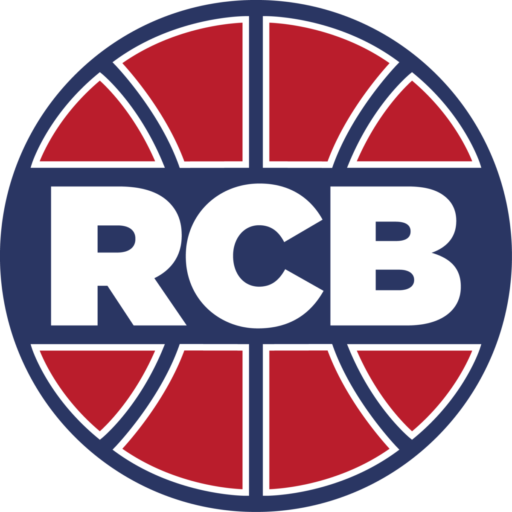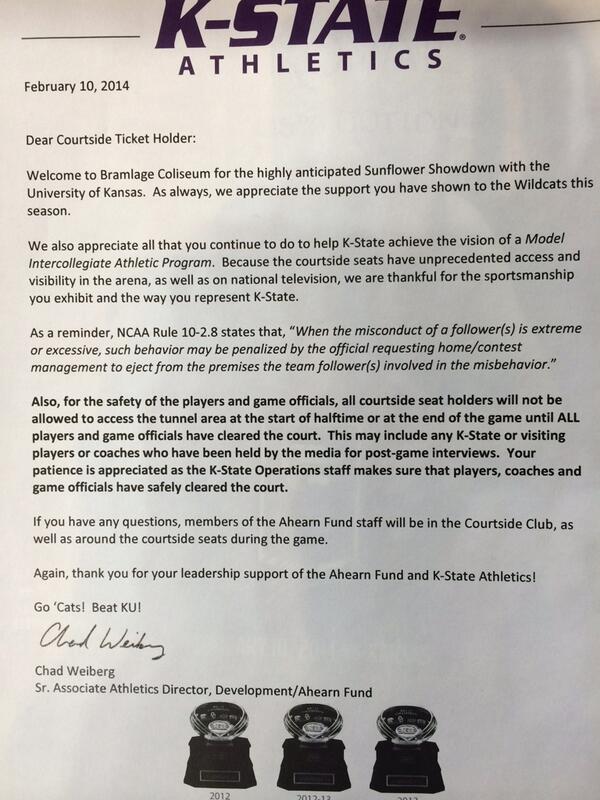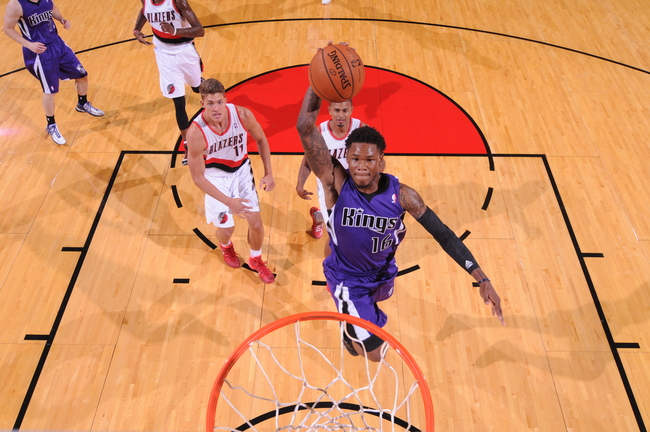Remembering Bob Frederick
It is honestly hard to write a fitting tribute to someone like Bob Frederick, who passed away on Friday, June 12th. There were so many aspects to his life that he was exceptional at–an athletics director, an athlete, a coach, a teacher, and most importantly as a friend, husband and father.
Frederick is and always will be a legend. Not because he was an excellent athletics director, a leader in many positions in the NCAA, a coach, or even a wonderful teacher. He is a legend because he radiated kindness. He was an honest man with integrity and high ethical standards. Joe Posnanski of the Kansas City Star said it best in his June 13th column: “He was a gentleman and a gentle man.”
Frederick wrote an article for Sports Management Resources in February of 2008 entitled “Fewer ‘Go-Givers’ and More ‘Go-Getters.’” The article was about a man named James “Easter” Heathman who was a farmer in Kansas who first discovered the wreckage of a TWA plane which Knute Rockne was a passenger on. He refers to a quote from Charles O’Donnell in the Eulogy of Notre Dame football coach Knute Rockne.
“In an age that has stamped itself as the era of ‘go-getter, he was a ‘go-giver,’ giving himself, spending himself like water, not for himself, but for others.”
Frederick was a go-giver. Anyone who knew him would tell you that Frederick put others before himself.
In a time which athletic departments are more concerned about the bottom line, Frederick’s philosophy was quite different. Student athletes always came first for Dr. Bob, as his students affectionally called him.
“I’ve worked in college athletics for close to eight years and sometimes things can get complicated,” said Kyle Krueger who earned his masters in Sports Administration at Kansas in 2003. “When that happens, I think about Dr. Bob’s fantastically simple explanation: ‘When it comes to the job, put the student-athletes first.’ I can still remember sitting in a classroom on the second floor of Robinson, and writing that down in my notes, and being struck by how simple and profound that piece of knowledge was.”
• • •
Frederick, 69, passed away Friday night from devastating head injuries suffered in a biking accident Thursday on Kasold Drive in Lawrence. Frederick took up biking when his knees simply couldn’t take running anymore.
Frederick became an advocate of wearing helmets fifteen years ago when he had a near fatal bike accident near Clinton Lake.
A helmet wasn’t enough this time to save Frederick, who hit a pothole and flipped over the handlebars late in his 58-mile bike ride on Thursday.
As sad as it is, it almost seems fitting that Frederick was doing something he enjoyed in the town he loved so much before leaving us.
On Wednesday afternoon, hundreds of people celebrated Frederick’s life at a ceremony at the Lied Center.
Those who spoke included Frederick’s close friend David Ambler, Kansas volleyball player and 2008-09 Big 12 Sportsperson of the year Katie Martincich, Kansas volleyball coach Ray Bechard, former Iowa State and Kansas State athletics director Max Urick, and Frederick’s four sons: Brad, Mark, Chris and Brian.
One scripture that was read by Reverend Dr. Peter Luckey was Timothy 4:7 which reads “I have fought the good fight. I have completed the race. I have kept the faith.”
Frederick was an organ donor and family said during the service that his organs have saved three lives and skin tissue has been used to help fifty other people.
• • •
Frederick’s legacy will always be associated with the hiring of former Kansas basketball coach Roy Williams and current coach at North Carolina. Under Williams, Kansas would become the winningest college basketball team in the 90’s.
“As fine a man as could possibly be, that was Frederick,” Williams told Associated Press sports writer Doug Tucker. Williams was in attendance at Frederick’s service on Wednesday.
In a 2008 interview for the Kansas Basketball Vault Book with my father, sportswriter and author Ken Davis, Frederick acknowledged he gets a lot of credit for hiring Williams, who had never been a head coach before. “Part of it was luck,” Frederick said.
It is almost impossible to list everything that Frederick achieved in his lifetime. He earned Bachelors, Masters, and Doctoral degrees at the University of Kansas. He was the second longest tenured Director of Intercollegiate Athletics at the University of Kansas, from 1987 to 2001. While athletics director at Kansas, KU ranked sixth among all universities and colleges in the nation in production of Academic All-Americans (40) during the 90’s. The Jayhawks won 32 conference championships and a national title in men’s basketball in 1988.
During the 1992-93 academic year, Kansas became the first school to win a football bowl game, reach the men’s basketball Final Four and advance to the baseball College World Series in the same school year.
Frederick also served the Division I Men’s Basketball Committee, the NCAA Committee on Women’s Athletics and NCAA Committee on Sportsmanship and Ethical Conduct.
Frederick played basketball at Kansas in 1960-61 under head coach Dick Harp. He was a KU assistant basketball coach under Harp from 1963-64 and later under Ted Owens in 1971-72.
In the book “What It Means to Be a Jayhawk” by Jeff Bolig and Doug Vance, Frederick was quoted about his playing career at Kansas.
“As it turned out, I got into one game – very briefly – during the first semester, and I believe it came against North Carolina,” said Frederick. “Little did I realize that would be the extent of my college basketball playing days. I was outside running during the semester break, stepped in a low place in the ground, and severely twisted my knee. It required surgery in the spring and my playing career was basically over.”
After coaching high school and college basketball for a while, Frederick took a job at Lawrence High School, which he coached from 1977 to 1981. It seemed like he always made it back to Lawrence…
In 1981, Frederick became the assistant athletics director at Kansas and the Executive Director of the Williams Education Fund before becoming the Athletics Director at Illinois State in 1985. In 1987, Frederick returned as the Athletics Director at Kansas before resigning in 2001.
Since then, Frederick taught in KU’s department of Health, Sports, and Exercise Science in the School of Education. He specialized in sport management, sport law and sport facilities.
• • •
Late Thursday night, I saw the breaking news story about Frederick. My heart immediately dropped when I read the story. All Friday afternoon while at work, I frequently checked local paper’s websites for any updates. I texted Sarah Stokowski, a friend of mine, who graduated from Kansas in 2008 with a degree in Sports Management and who would always praise Dr. Bob for his kindness, compassion and knowledge whenever I spoke to her.
Stokowski is currently a graduate student at the University of Oklahoma and could not make it to Frederick’s ceremony at the Lied Center on Wednesday because she had a midterm for a summer course.
“Dr. Bob wouldn’t want me to miss class.”
• • •
I met Dr. Frederick the day I stepped on the University of Kansas’ campus after I decided I was going to be a Jayhawk. My father set up a meeting with Dr. Frederick to speak to my parents and I about sports management. It was during the summer of 2006 and I really had no idea what I was going to do for my major. Much like Dr. Frederick, I was drawn to Lawrence. Both my parents were alumni of KU and I had lived all of my life in Connecticut. I had no idea what to expect.
Dr. Frederick filled me in within an hour of h
ow my path would be to graduating from KU. He laid out everything for me: what classes I should be taking and in what semesters, and what my goals would be.
More than two years later, October 27, 2008 to be exact, I had a meeting with Dr. Bob (he turns into Dr. Bob at this point, as he signed his email this way). I wasn’t on path to graduate in sports management due to several factors. I was devastated and lost. Dr. Bob made me feel a lot better about what was happening because he told me that if I were to switch to journalism, I could still take take some sports management courses, including his sports law class (which by the way, was the consensus favorite course of fellow students I spoke to).
I never got to take that Sports Law class and I don’t see myself taking it in my undergraduate studies at Kansas either.
My biggest regret is not speaking to him more. He was the perfect role model within a five minute drive from my apartment. Dr. Bob is what we all should strive to be.
• • •
I asked some of my friends and colleagues to give their reflections on Dr. Frederick.
“There isn’t really one memory that specifically sticks out to me about Dr. Frederick. Instead, I’ll always remember simply that his classes were great, and that he was an even better person. Dr. Frederick reached the highest levels of achievement in his profession, yet remained extremely approachable and made it obvious that he cared for his students and was willing to help them out — regardless of who they were. He will always be a role model for me given his accomplishments as an AD, but more so because of his character and the way he tried to inspire others to conduct themselves with similar class. Developing a relationship with Dr. Frederick will always be one of my fondest and most influential memories of my time at KU.” – Eric Wieberg, Sports Management at the University of Kansas, currently a graduate student at the University of Texas.
“[Frederick] told us a story about when he was chairing the NCAA Men’s Basketball Committee and his son had an important basketball game. Obviously, the committee has a huge job to do in a limited amount of time. But he regretted not flying out for the two hours of his son’s game, and flying back that night. The committee wouldn’t be in session during those few hours, but he thought he should be there in case something came up. I’m not sure there are many other people that would even consider doing that, but looking back he knew that the tournament would have run just as smoothly if he was gone for a few hours one evening.” – Kyle Krueger.
“I met Dr. Bob fall semester of my junior year. I had him for sports law and I really didn’t like him at first. I was kind of intimidated by him and I didn’t know what to think or how to perceive him. On my first test, I got a 57%. He talked to me and worked with me. We got to really know each other that way by helping me out with class. He was always willing to go above and beyond. He cared about me as an individual. He knew about my situation particularly because I’m from Chicago and I was homesick and I was really close to my family. He had four boys of his own so he kinda knew the importance of family and family values and keeping in touch with your family even though you’re so far away. In a way, he became my grandpa in that sense. He always made sure I was okay and made sure I was calling my mom and was always asking me how my family was doing. In spring when it came time for me to take out an internship, Dr. Bob suggested I go to the University of Missouri to complete my degree so I went to set up an interview with Mike Alden (the AD for Missouri), called [Frederick] up and he gave me a really good reference. He pretty much got me my internship. I went down there for my interview. I remember I was so excited when I found out I got it and I called Dr. Bob and he was for me. It didn’t matter that it was Missouri to him. it just mattered that I was doing what I wanted to do. But he kinda helped me get there. I walked down the hill at graduation and I remembered Dr. Bob got me out of the line and took pictures and I was crying because it meant so much to me. I didn’t want to leave but knew we’d still keep in touch. I remember coming back to Chicago right after I graduated before I headed to my internship and Dr. Bob had sent me a package and it was a Mizzou shirt. I think it was the only Mizzou shirt he ever bought. But he’s from St. Louis so he told me to represent his home state and was proud of me and knew that I was going to do a great job.” – Sarah Stokowski, who graduated from Kansas in 2008 and is currently completing her Masters in Intercollegiate Administration at University of Oklahoma and is applying to schools now for her Doctorate of Philosophy.
Kansas basketball coach Bill Self and Texas A&M coach Mark Turgeon, who played at Kansas and was an assistant coach at KU, offered their thoughts on the Big 12 conference call Tuesday afternoon.
Self pointed out Frederick wasn’t athletics director when he was a graduate assistant on Brown’s staff and wasn’t athletics director when he returned to KU as head coach, but said he did feel he knew him “a little bit” but not “in a way a lot of people were blessed to know him.”
“The thing that he did epitomize at all times was class,” Self said. “Everybody thought he was as professional and as classy a gentleman as there is. And a great role model . . . which I think is a fabulous compliment.”
“I had somebody, who has been at the University for many, many, many years and is very well respected at the University, tell me this is the biggest loss our university has ever had,” said Self. “Just from a standpoint of how he was viewed: his community involvement, his reputation and the impact he’s had in different things – whether it be coaching, Lawrence High School, charity work, or the contributions he made to the athletic department and the educational system. He was a fabulous instructor that all students really thought a lot of.”
“In my senior year of college,” said Turgeon. “I was trying to get into coaching. [Frederick] was a young coach and I asked him for some advice. He went out of his way and gathered information for me. ‘Do I need a master’s degree?’ and all that kind of stuff. He really went out of his way there.
“Then when Coach [Larry] Brown left, and Coach [Roy] Williams came in, I didn’t have a job,” continued Turgeon. “[Frederick] and his wife went out of their way to convince Coach Williams to keep me on the staff there. I’ll never forget that. They didn’t have to do that, but they believed in me. And that’s just my story. I’m sure you could have many, many more stories. Every time I saw him with my wife, who was a Kansas grad, he was just always concerned about our careers. He used to call and encourage me and do different things. So yeah, he was a special person and he was a big part of my life.”
• • •
Dr. Frederick finishes his article for Sports Management Resources with this: “We need more people like Knute Rockne and Easter Heathman leading our young people.”
Truth is, Dr. Bob is interchangeable with those names in that sentence.
We will miss you, Dr. Bob. The world was a much better place with you in it.
We need more people like Dr. Frederick leading our young people.
• • •
“I wouldn’t trade those years at KU for anything,” said Frederick in “What It Means to Be a Jayhawk.” “I’ve always been amazed at the emotional attachment that people have to the University of Kansas. I’m not sure there is another public university that has such a strong emotional attachment for alumni as this one seems to have. From my observation, it’s tied to both the athletic and academic traditions. I believe they are unique and set us apart from most other public universities.”
“P
eople don’t forget about this place. It becomes part of their life forever. It certainly has for me.”
One thing is for sure, KU will never forget Frederick.




Wow, wonderful blog layout! How long have you been blogging
for? you make blogging look easy. The overall look of your web
site is great, let alone the content!
Hi there all, here every one is sharing these familiarity,
so it’s pleasant to read this webpage, and I used to pay a visit this website
daily.
I really like reading a post that can make men and women think.
Also, thanks for permitting me to comment!